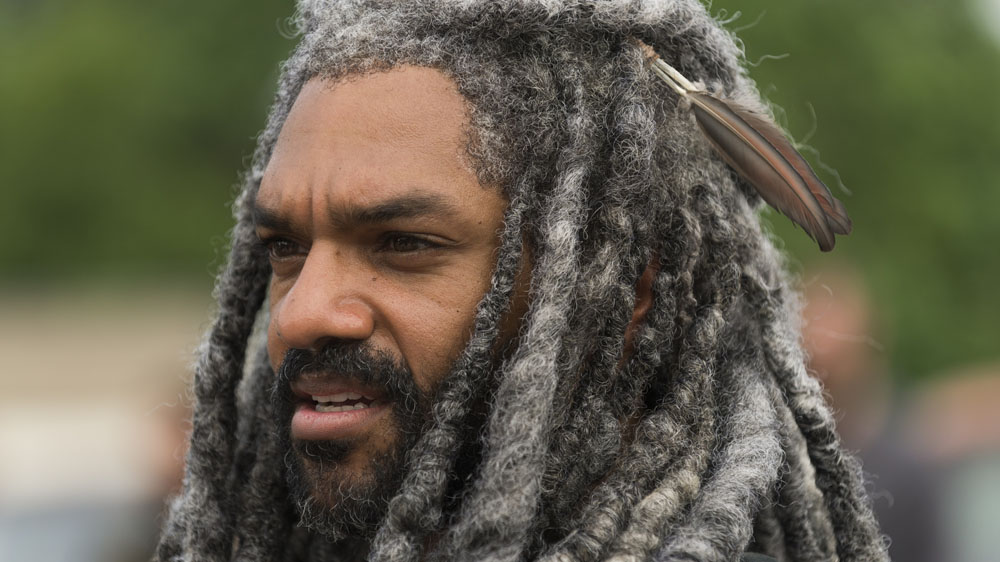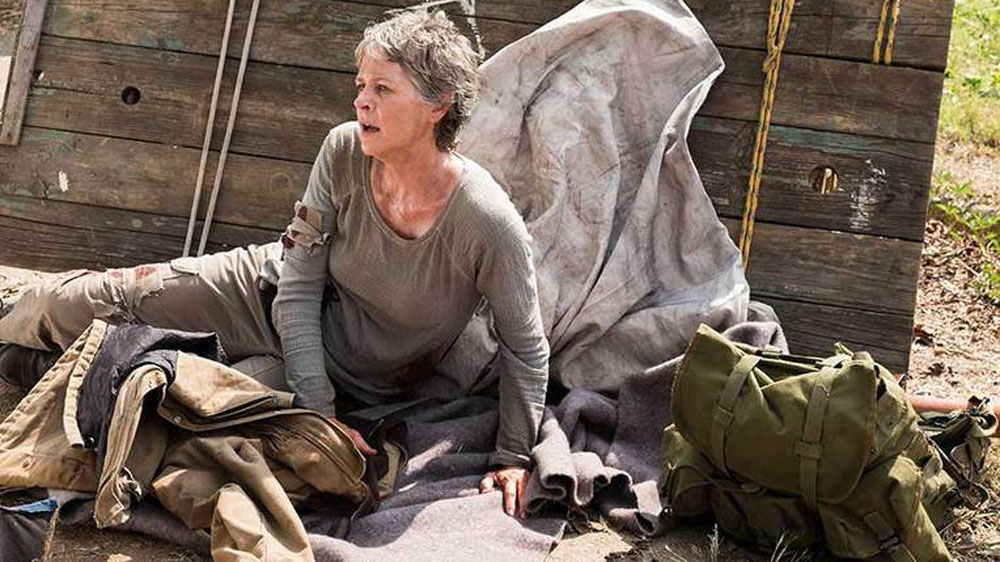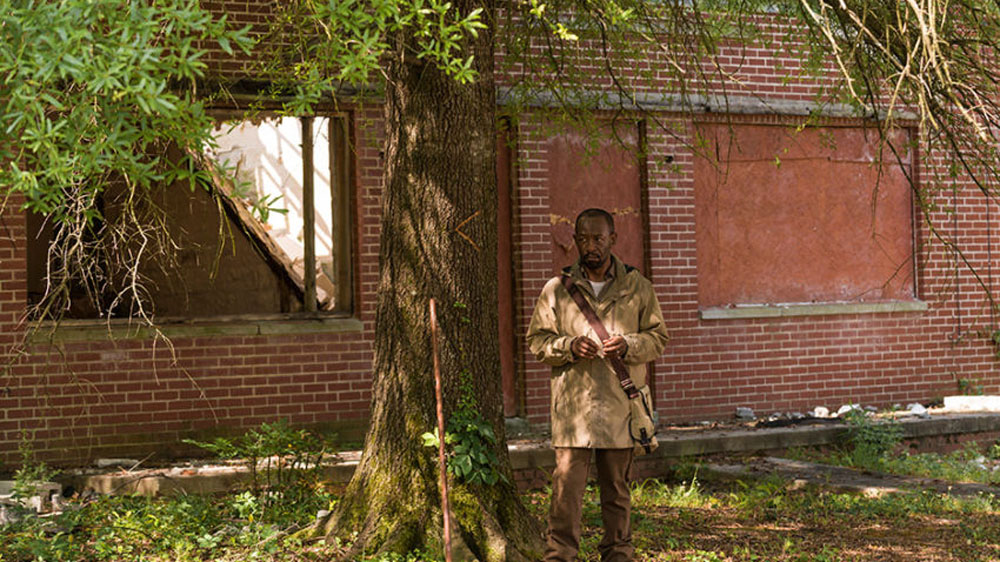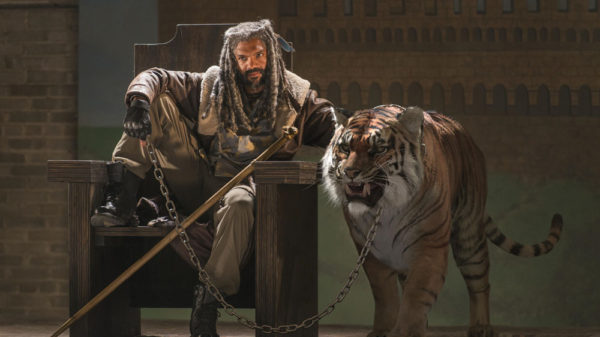Season 7 began last week with a dark, extremely violent episode that wallowed in its own nihilism and total hopelessness throughout. This week, it’s entirely the opposite.
Interestingly, ‘The Well’ was filmed third and swapped in the running order with next week’s episode that focuses on Daryl’s torture in the Sanctuary, partially because of how disconnected it is from the main body of the narrative right now. That choice to place this episode as the direct follow-up to the beginning of Negan’s reign of terror over Rick’s group is a bold one, but it pays off in spades here.
‘The Well’ may not be a truly vintage episode of The Walking Dead, but it’s the ideal episode to wash away some of the bitter taste that last week’s premiere left, balancing out some of that episode’s grimness with a refreshing burst of optimism and hope. Not a huge amount happens, but that actually works in the episode’s favour, with the episode’s serene, contemplative pace allowing The Walking Dead to refocus on character above schlocky horror.
The headliner here is the introduction of notorious comics characters Ezekiel and his pet tiger (yep, it’s that kind of episode) Shiva alongside a new settlement, the Kingdom, and these new elements provide an invigoratingly different tone and atmosphere to distinguish this episode from the premiere. The Walking Dead’s world-building has always been one of its most enjoyable facets, and there’s a real skill in how it carefully crafts a vibrant and lived-in society in just 45 minutes.
The Kingdom has a genuinely unique feel compared to the many other settlements that this show has offered up, with the community viewed through a saturated and vibrant lens as the sun beats down upon the residents, mixing with the contented chatter of a society that has found genuine tranquillity and happiness at the end of the world.
In short, it’s the kind of aspirational, vaguely Utopian land that represents the ideal for a post-apocalyptic community, with very little of the darker, seedier side that underlies most of the previous communities that our heroes have visited, contributing to the episode’s almost startling sense of optimism.
That optimism is eventually mirrored within King Ezekiel, the showy new addition who debuts as a caricatured buffoon but eventually reveals some fascinating inner depths. Ezekiel is a difficult character to pull off because he’s, albeit intentionally, so at odds with the gritty atmosphere that The Walking Dead aims to cultivate, but ‘The Well’ threads that needle delicately thanks to Khary Payton’s terrific dual performance.

Payton takes the difficult job of bringing realism to a cartoonish, pseudo-Shakespearean ruler and making him a character that rational people would genuinely follow with ease, but it’s in his final scene with Carol where the skill of his performance really reveals itself. It’s a seamless shift, but the way in which Payton’s performance turns on a dime from regal to everyman is still one of the most commendable aspects of this episode, nailing the duality of a man with two personas by making each side equally convincing within this show’s particular atmosphere.
It’s with Ezekiel that ‘The Well’ makes its most poignant point – that it’s not necessary to consign oneself to the fact that the world is cruel and that giving in is the only reaction, and that there is a way, however unconventional, to bring meaning to life and give people an ideal to follow amidst hopelessness.
His creation of the exaggerated ‘King’ persona isn’t ultimately sneered at, unusually, but is eventually presented sincerely as a pragmatic and ultimately beneficial solution to the difficulties of creating a community, and it’s that straightforward depiction of such an optimistic ideal with Ezekiel that particularly makes ‘The Well’ a breath of fresh air after last week’s premiere squeezed every ounce of hope from the show.
Aside from Ezekiel, ‘The Well’ zeroes in on two of the characters that The Walking Dead has been most preoccupied with lately, Carol and Morgan. They’re both rich and complex characters who have, at one point or another, been pretty much the most interesting in the entire cast, but season six’s rapid transformations of both into pacifists lacked enough nuance and groundwork (Morgan’s focus episode last year was great, but the show slipped into making him a sanctimonious lecturer from then on) to truly make sense.
However, ‘The Well’ did go some way towards rehabilitating these two key characters and placing them on a much more convincing and encouraging track going forwards. In particular, it’s Carol who gets the strongest material. It does so by returning a little to Carol’s most interesting stage as a character, where she masked her real status as a brutal killer by pretending to be an innocent housewife, and probing into the motivations for her consistent covering up of her true self.

There’s a strong contrast drawn between Carol and Ezekiel here as two people who put on acts to survive, increasingly finding that the act and the true self become indistinguishable as they become used to lying, which helps a great deal to regain some clarity of just what is making Carol tick at this point. In particular, ‘The Well’ latches onto one of the clearest aspects of her development last year, which was her slip into numbness and a lack of desire to go on living in the apocalyptic world and finds a convincing reason to steer back in another direction.
Her talk with Ezekiel is cleverly laid out as the meeting of a kindred spirit who offers her a blueprint for life that she had previously never conceived of in her depressed funk, and by the end of the episode her decision to take Ezekiel’s offer to ‘leave, but not leave’ convincingly illustrates how Carol is increasingly finding a concrete place in society that allows her to come to terms with who she really is with no pretences.
It’s not clear just how often we’ll return to Carol now that she’s pitched up in her new house away from the Kingdom, but ‘The Well’ managed to bring back some vibrancy and promise to her character by offering an optimistic new path at the other side of her grim character journey last year.
Morgan’s journey in ‘The Well’ is less compelling, partially because the episode doesn’t find the requisite balance between his and Carol’s stories. While Carol’s is fully fleshed-out and convincing, Morgan’s character arc doesn’t have that same clarity, proceeding in fits and starts and coming to a major turning point for his character that ‘The Well’ hasn’t really earned due to its lack of scenes between Carol and Morgan after the beginning.
Nonetheless, there’s still plenty to enjoy with Morgan’s scenes, and it’s particularly good to see that ‘The Well’ preserves some of his uniqueness while pulling on the loose thread of his pragmatic choice to pick up a gun and shoot a Savior in last season’s finale. In essence, Morgan is a better-rounded and more nuanced character here than he was last year, with Morgan actively acknowledging that he doesn’t have a full view of life yet and is still, essentially, making it up as he goes along.
That’s a refreshing confession to have, not only because it’s more realistic to see that Morgan is aware of his philosophy’s shortcomings and of a need to break from it when the situation calls, but because it allows for Morgan to become a much more likeable figure, with his sanctimonious tendencies dialled way back as he allows others to live the life they want without judgement.
Morgan’s arc doesn’t have the completeness of Carol’s, but there are flickers of excellence throughout and there’s a clear sense that The Walking Dead is walking a more complex path with the character than it was last year.

‘The Well’, all in all, is a solid episode. It doesn’t break a lot of ground for The Walking Dead, scattering in tropes and ideas from throughout the show’s history, and the lack of urgency here lets some of the momentum from last week’s premiere, no matter how shaky that momentum was, leak away.
Yet it works not only because it offers a satisfyingly complete arc with an interesting new character and some strong development, but also because of what it tells us. It shows that The Walking Dead isn’t stuck in the grim mire that it found itself in last episode, and that it’s still capable of genuine variety, with the optimistic message of this week’s episode contrasting drastically with the premiere.
On its own, it’s perhaps not quite enough to fully put the season back on track. Yet it’s a promising indicator that last week’s episode doesn’t have to be the norm for this show, and that it’s able to offer something deeper than pure pessimism and hopelessness.
Aired at 9pm on Monday 31 October 2016 on FOX.
Buy the complete Season 1-6 box set on Amazon here.
What did you think of this week’s episode? Let us know below…

